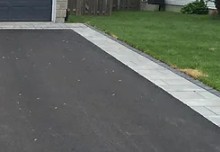Asphalting, concrete block paving contractor Stouffville, low wall constructions or concrete edging: we’re skilled for all types of residential projects. Give your paving project a touch of class and professionalism, and give us a call. 20 YEARS OF EXPERIENCE!

Interlock paving, known for its durability and aesthetic appeal, has become a popular choice for driveways, patios, and walkways. However, while this paving method is designed to withstand various environmental conditions, the weather can significantly impact its performance and longevity. Understanding these effects can help property owners take proactive steps to ensure their interlock paving remains in top condition. In this article, we’ll explore how different weather conditions affect interlock paving and what you can expect throughout the seasons.
In regions where temperatures drop below freezing, interlock paving faces several challenges:
Frost Heave: Water that seeps into the joints can freeze and expand. This process can lead to lifting or shifting of the pavers, creating uneven surfaces. Proper installation techniques, including ensuring adequate drainage and using appropriate base materials, can help mitigate this issue.
De-icing Agents: Many property owners turn to de-icing agents during winter to make surfaces safer. However, some de-icing products can negatively impact the pavers and sealants. It's advisable to choose products that are safe for interlock paving to avoid discoloration and surface wear.
Maintenance Considerations: Regular maintenance is crucial during winter months. Snow should be cleared promptly, and the use of plastic shovels is recommended to prevent scratching the surface.
Summer heat brings its own set of challenges for interlock paving:
Thermal Expansion: Extreme heat can cause pavers to expand. Although interlock pavers are designed to accommodate slight movements, excessive heat can result in visible gaps between pavers. It's essential to ensure that the installation is done correctly, allowing for expansion joints where needed.
Sealant Performance: If sealants have been applied to the surface, high temperatures can cause them to break down quicker, leading to the need for more frequent reapplication. Choosing high-quality sealants designed for extreme temperatures can enhance durability.
Surface Heat: On particularly hot days, interlock surfaces may become uncomfortably hot for bare feet or pets. Using lighter-colored pavers can help mitigate heat absorption.
Moisture is both a friend and foe of interlock paving:
Erosion and Drainage: While interlock paving is designed to allow rainwater to permeate through the joints, heavy downpours can overwhelm drainage systems. Proper grading and drainage solutions must be incorporated during installation to prevent erosion and keep water from pooling.
Moss and Algae Growth: Prolonged exposure to moisture can lead to the growth of moss, algae, or mildew, especially in shaded areas. Regular cleaning and the application of anti-fungal treatments can help maintain aesthetics and safety.
In humid environments, the challenges can be unique:
Moisture Retention: High humidity can lead to prolonged moisture retention between pavers, increasing the risk of growth for unwanted vegetation. Routine maintenance, including sweeping and occasional pressure washing, can help curb this growth.
Sealant Efficacy: In high-humidity areas, the performance of sealants can vary. It's important to choose sealants that are recommended for specific climate conditions, ensuring that they adhere properly and offer long-lasting protection.
As seasons change, regularly assessing the condition of interlock paving can prevent larger issues down the line. Here are a few general tips:
Inspection: Conduct seasonal inspections to check for any shifting, erosion, or unwanted growth.
Seasonal Cleaning: Regularly clean your interlock surfaces to prevent the buildup of dirt and debris.
Reapply Sealants: Depending on your local climate, you may need to reapply sealants periodically to ensure ongoing protection.
Professional Help: If you experience significant weather-related damage, consulting with a professional paving contractor can provide tailored solutions for repair and maintenance.
Weather undeniably affects interlock paving, influencing its performance, appearance, and longevity. Understanding these effects allows property owners to take preventive steps and maintain their paving in optimal condition. By being proactive about seasonal changes and adopting regular maintenance practices, you can ensure that your interlock paving continues to add beauty and functionality to your outdoor spaces for years to come.